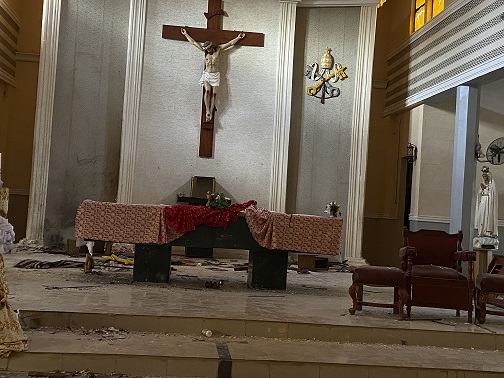According to local sources, a Catholic church in southern Nigeria was assaulted by gunmen on Sunday, and the attackers opened fire on worshippers inside the church while they were celebrating the Eucharist. It is thought that the incident resulted in the deaths of dozens of people.
The assault on the St. Francis Catholic Church in Owo, which took place in Ondo State, was the deadliest attack on a church in Nigeria in recent years. It brought the kind of violence that is typically seen in the north of the country to a relatively peaceful area of the continent’s most populous nation, Nigeria.
The assault took place on the Sunday of Pentecost, when a large number of believers were assembled inside the church. According to the reports made by the police, there were at least four individuals who broke into the building.
It was the first time in recent years that an assault on a church had taken place in the state of Ondo, bringing a new feeling of danger to a state that had been spared the kinds of violence witnessed in other parts of Nigeria.
The president of Nigeria, Muhammadu Buhari, who has made it a commitment to address the country’s state of insecurity, has denounced the assault as a “heinous crime.”
As of Sunday night, there had been no claim of responsibility, and it remained unknown what the motivation was behind the slaughter.
The majority of assaults on churches have taken place in the north, while their frequency has decreased since it was at its most around the year 2015 when the Boko Haram insurgency was at its height. There have been kidnappings in the southwest, most of which have been carried out by herders in search of ransom, and there have been disputes with herdsmen over new limitations on open grazing. This is the region where the assault on the church took place on Sunday.
The casualty count from the incident that occurred on Sunday was still being determined by officials. Videos of dead people lying in pools of blood between church seats were shared on various social media platforms.
At least twenty people were killed, including a large number of children, according to Oluwole Ogunmolasuyi, the majority leader of the Ondo State Assembly. Ogunmolasuyi visited the scene of the slaughter and reported his findings. He placed the number of fatalities anywhere between 70 and 100.
According to statements made to the Associated Press by Adelegbe Timileyin, a federal legislator who represents the Owo region, at least fifty persons were slain in the attack.
The assault took place in the midst of renewed social and economic tensions in Nigeria, a country where frequent kidnappings and homicides have contributed to a pervasive feeling of insecurity and resentment toward the government in advance of the next presidential election, which is scheduled to take place in February.
According to a statement released by the police on Sunday evening, at the time when Mass was being held about 11:30 a.m., armed intruders fired shots at parishioners from outside the church, while other shooters targeted individuals within the structure.
Christians make up the majority of the population in the country’s southern region, while Muslims make up the majority of Nigeria’s northern population.
The regions of Nigeria’s northwest and centre have been the most often affected by the bloodshed and kidnappings that have plagued the nation in recent years.
This past month, gunmen killed dozens of people in the state of Plateau, which is located in the country’s central region. Additionally, in April, eight people were killed and dozens more were kidnapped on a popular train route that connects the nation’s capital, Abuja, to the regional hub of Kaduna, which is located in the country’s north.
The incident, which took place on a road that the government had said was a secure alternative to a highway where kidnappings by bandits are routine, enraged a great number of Nigerians, many of whom blamed Mr. Buhari for his failure to curb the spike of violence in the country.
There has been no claim of responsibility for the assault on the train made by any organisation. The police have said that the assault was carried out by a collaboration between members of the terrorist organisation Boko Haram and local criminals. There are still many dozens of travellers being kept captive by their captors.
There have been reports of Muslims and Christians in this nation engaging in violent altercations on occasion. A Christian girl was brutally murdered and her corpse set ablaze a few weeks ago after she was accused by her Muslim classmates of sending blasphemous words about the Prophet Muhammad in the context of a group chat that took place on WhatsApp.
According to the Abuja police, a man was slain and set on fire to death in the city last week after getting into a disagreement with a Muslim priest. Late in the month of May, the leader of the Methodist Church in Nigeria was taken hostage. He was freed a few days later after Methodist authorities announced they had paid a ransom for his freedom.

